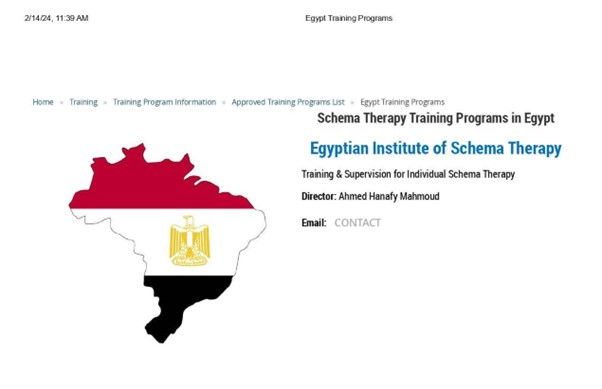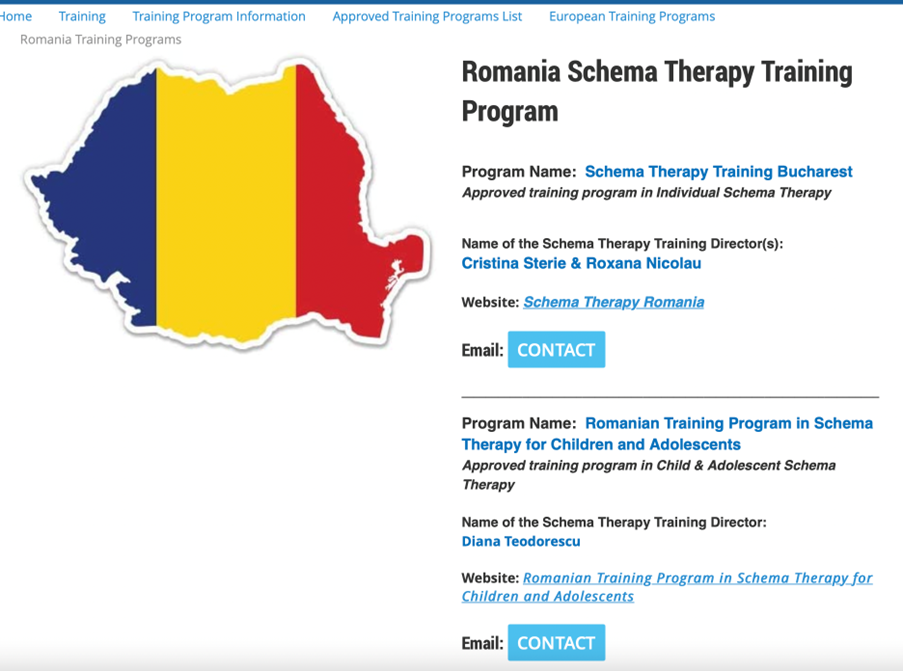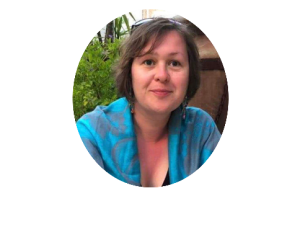Training programs
Basic Curriculum in Schema Therapy: (individual therapy)
Our program covers all the requirements according to the 2018 ISST certification and curriculum requirements for Individual Schema therapy (60 hours divided to 35 Didactic hours, 25 role play hours).
Trainer: Dr. Ahmed Hanafy Mahmoud
Training Details:
- 9 full training days (8 hours a day)
- 10:00 am – 6:00 pm
- Within 3 months
- We are running our training program twice a year
- First Diploma “January, February, March”
- Second Diploma “August, September, December”
Training program content:
| Module Name | Subject covered* | Hours Specification |
| Introduction to schema therapy | Schema theory: Schemas, coping styles and modes. Assessment process of schemas and modes: using inventories (YSQ, SMI etc.); interview and imagery. Temperamental factors. Psycho-education about needs and rights of children and their links to developing schemas and modes. Case conceptualization, treatment formulation and session organization. Goals and needs in terms of schemas and modes, and case conceptualization | Didactic: 6 |
| Role-play: 4 | ||
| Therapeutic Relationship in Schema Therapy | Limited re-parenting. Empathic confrontation and setting healthy boundaries in therapeutic setting. Ethical aspects in working with personality disorders. Projection and triggering, Appropriate self-disclosure, Therapist’s Schemas: when therapist’s schemas become activated, obstacles and ways to use that activation in a healthy way. | Didactic: 8 |
| Role-play: 6 | ||
| Therapeutic techniques used in Schema Therapy | Cognitive techniques: self-monitoring logs” record sheet”, schema diaries, reframing/ reattribution, schema flash-cards and schema dialogues. Experiential techniques: imagery and imagery re-scripting, chair work, mode dialogue, creating emotional bridge (linking schemas and modes with Early Childhood experiences). Using different emotional-focused techniques to work in an adapted way with each Schema Mode:- Limited re-parenting with Child Modes.- Empathic confrontation with Maladaptive Coping Modes-Confronting and setting healthy boundaries with Parent Modes. Behavioral techniques: Socratic Dialogue, Down Arrow, cognitive distortions list, cognitive destruction to challenge the assumptions of the maladaptive schemas and pros and cons techniques, schema flash-card focused on alternative healthy behaviors; rehearsing alternative behaviors in imagery or role-play, behavioral homework, associating behavior with self-administered reward or contingencies, and skills training. Homework assignments in ST:Exploring maladaptive modes, Schema triggers and mood analysis logbook, behavioral pattern breaking, functional analysis sheets, Schema diaries “triggers, emotions, thoughts, behavioral, schemas, unmet need, healthy view, healthy reaction and behaviors”, flash cards, validate the child mode by listening to the record tape of the session, imagery work, writing letters to significant others. And psychoeducation by reading, or watching some videos. | Didactic: 10 |
| Role-play: 8 | ||
| Schema Therapy with specific populations | Schema therapy for cluster B: schema therapy for borderline personality disorder Schema Therapy for Narcissistic Personality disorder. Schema Therapy for Antisocial Personality disorder. Schema Therapy for Histrionic Personality disorder. Schema Therapy for Cluster C: Schema Therapy for Dependent, avoidant, and OCPD Personality disorder. Schema Therapy for other Personality Disorders: Schema Therapy for PTSD, and Addiction disorders. Schema therapy for other non-personality disorders: anxiety, depression or eating, couple therapy. | Didactic: 11 |
| Role-play: 7 |

Schema Therapy for Children and Adolescents program
Schema Therapy Egypt honored and proudly to cooperate with Romanian Training Program in Schema Therapy for Children and Adolescents.
The Romanian Certification Training Program in ST-CA meets all the ISST requirement, but also brings some extra perspectives and approaches: how to work with groups of children using ST-CA model, how to integrate the ACT model- the Contextual ST approach, etc.
Trainer: Dr. Diana Teodorescu. (Romania)
Training Details:
- 6 full training days (9 hours a day)
- 9:00 am – 6:00 pm
- Within 3 months
- We are running our training program once a year “January, February, March”
The Romanian Certification Training Program in Schema Therapy for Children and Adolescents offers an 48 hours training focused on: the schema therapeutic conceptual model (schemas, modes, coping strategies), the underlying theory (central importance core needs in the context of developmental tasks), possible diagnostic means (eg, projective methods) and requirements in the therapeutic attitude (eg, concept of “limited reparenting” and “empathic confrontation”) are outlined, put on the ground of temperament and personality factors in childhood and adolescence. However, in the center of the workshop series are training and practice units, encompassing schema therapeutic strategies that have proven successful in childhood and adolescence.
Another focus is laid on the teaching of advanced and deepened work with parents in terms of “Schema Coaching” or “Systemic Schema Therapy“ that include schema or mode specific transactional processes between child and parent and shed a light on mutual reinforcement’s processes of child’s und parent’s maladaptive schemas.
The training program modules:
| First Module: | Introduction to schema therapy, specific issues in working ST with children and adolescents, differences given by temperament and personality factors in childhood and adolescence |
| Second module | Schema therapy techniques in child and adolescent And Schema Coaching for Parents |
| Third module | Focus: Schema-Coaching for Parents, Case Conceptualization and more specific techniques |
Who can participate?
All psychologists and psychotherapists who want to use this model in their practice. But only the ones who meet the requirements below can become Certified ( by ISST) Schema Therapists for children and adolescents.
Requirements to be certified at Standard and/or Advanced Levels in ST-CA, From 2020 on:
Psychotherapists eligible for certification in ST-CA must prove that – prior or during their training in ST-CA – they have acquired special knowledge and qualification in CBT, Psychodynamic or other specific training in Psychotherapy for children, adolescents and families, according to legislation or rules in their country. This can be given by – a CBT, Psychodynamic or other specific training in Psychotherapy designed especially for work with children, adolescents and families – or a special qualification on top of general or adult CBT, Psychodynamic or other specific training in Psychotherapy allowing to work with children, adolescents and families – or as an alternative, a minimum of 3 years professional practice in the field of CBT, Psychodynamic or other specific Psychotherapy with children, adolescents and families.

https://schematherapysociety.org/Romania-Training-Programs
Group Schema Therapy Training Program:
Schema Therapy Egypt honored and proudly to cooperate with ST.PETERSBURG SCHEMA THERAPY INSTITUTE PRACOWNIA TERAPEUTYCZNA, Poland in Group Schema Therapy training Program.
It is eligible for 32 training hours credit in the International Society of Schema Therapy certification program. Participants will be granted with the ISST Certificate of Attendance which confirms completion of the training part (32 hrs.) of the Standard GST certification process.
Trainers:
ABOUT THE TRAINERS
 | Paul Kasyanik, PhD – is an Advanced Certified Schema Therapist, Supervisor and Trainer in Individual, Groups and Children-Adolescents ST. He has been treating patients, training professionals and supervising psychotherapists for more than 30 years. He is the co-founder and director of the Schema Therapy Institute in St.Petersburg, Russia. He has presented advanced Schema Therapy training at EABCT and ISST Conferences and Summer Schools as well as in training programs in 15 countries Since 2014. From 2016 Paul served as Science & Research Coordinator and from 2018 till 2020 as Certification Coordinator on the Executive Board of the ISST. |
 | Magdalena Kitlowska, MA – is a cross-cultural psychologist, CBT therapist and an Advanced Certified Schema Therapist, Supervisor and Trainer in Individual and Group ST. She has been working clinically in individual and group setting for over 20 years. She wrote several chapters and articles on OCD, Body shame, Eating Disorders etc. Currently she serves as Secretary of the ISST Executive Board. Magdalena’s current professional interest is focused on co-therapy and group process. She was teaching in Poland and abroad (Morrocco). |
Training Details:
- 5 full training days (8 hours a day)
- 10:00 am – 6:00 pm
- It will be once a year (April – May)
Group Schema Therapy was developed by Farrell & Shaw (1994, 2012). The GST model integrates their original group work with Young’s individual Schema Therapy & the ST outcome research of A.Arntz (2009). GST strategically uses the therapeutic factors of the group modality to catalyze the work of schema mode change. GST is a unique approach to ST that goes far beyond traditional group therapy models; furthermore, it does not simply incorporate individual ST interventions into a group format, rather, has developed new adaptations of ST interventions for the group modality. The central idea behind GST is that the group members, with the guidance of the therapists, create their own “family” in which they add sibling socialization to the reparenting the therapists provide. As part of this group corrective emotional process patients do imagery and roleplaying exercises in which they take on the roles of each group member’s various modes (e.g., the Detached Protector, the Healthy Adult, Punitive Parent) and ultimately heal them.
The experience of ST in a supportive, validating group can directly impact and heal key schemas such as, abandonment, defectiveness emotional deprivation, social isolation and mistrust/abuse. Like individual ST, GST improves: stability of self, interpersonal relationships, social, family, and occupational functioning and quality of life. There is considerable research now supporting the effectiveness of the GST approach, including empirical validation from a randomized controlled trial (RCT) (Farrell & Shaw, 2009) and pilot studies conducted in the US, the Netherlands, Germany and other countries (Farrell, Reiss, et al, 2014, Farrell, Arntz et al, 2022). These studies demonstrated very large positive effects from even a short group treatment of thirty sessions. A large multisite international RCT of GST for Borderline Personality Disorder also proved significant positive effect of GST combined with Individual ST. Outcome studies to evaluate the effectiveness of GST for Cluster C Personality disorders and mixed groups of Clusters B & C have been performed in the Netherlands. GST was developed with BPD patients but like individual ST it is adaptable to other challenging populations as well as entrenched maladaptive schema and mode effects in any patients.
This four-day training presents the GST model and its core interventions, which are used depending upon the stage of the group and the mode profiles of the group members. Core interventions include: group limited reparenting, group imagery re-scripting, mode-specific group role-plays, experiential group work and the distinctive two therapist model that is crucial for maintaining the essence of limited reparenting with the more severe disorders. The work of Farrell and Shaw as well as our own experience with Borderline personality disorder patients is presented along with the adaptations for other patient groups. Group Schema therapy functions in the same way as individual ST – i.e. therapist limited reparenting and mode change interventions are determined by the mode a patient is in. GST works by a patient’s mode and mode profile, rather than strictly by disorder.
For that reason, GST like ST, can be used with any patient population. Demonstrations by trainers with participants playing patients from their clinical population are used to demonstrate adapting GST interventions for the presenting modes of various diagnostic groups. The workshop incorporates: didactic sections with PowerPoint presentations and group discussion, demonstrations by trainers in which the workshop participants play patients and opportunities for participants to practice group interventions with coaching and feedback.
Schema Therapy couple therapy :
Schema Therapy Egypt is honored and proud to announce its collaboration with Schema Therapy Canberra (Australia) in offering a Schema Therapy for Couples Training Program.
This intensive program is accredited by the International Society of Schema Therapy (ISST) and offers 40 hours of training, exceeding the required 30 hours for the Schema Couples Therapy Certification. Participants will receive the official ISST Certificate of Attendance, marking the completion of the training component of certification.
For more details on Schema Couples Therapy Certification:
https://schematherapysociety.org/Schema-Couples-Therapy-Certification
Trainer: Ruth Holt
- Clinical Psychologist and Principal at Canberra Clinical and Forensic Psychology
- Certified Schema Therapist, Supervisor & Trainer in both individual and couples therapy
- Trained in Emotion-Focused Therapy and Gottman Method Couples Therapy
- Renowned speaker and trainer across Australia and Asia
- Editor of Schema Therapy for Children and Adolescents
- Published work on Schemas and Intimate Partner Violence
Training Dates:
- May 9 & 10
- June 13 & 14
- July 11 & 12
- August 10 (Saturday)
Fridays: 9:00 AM – 1:00 PM
Saturdays: 9:00 AM – 2:30 PM
Total: 40 training hours
What You’ll Learn:
- Schema-focused assessment and case formulation
- Working with high-conflict couples
- Understanding and interrupting destructive mode cycles
- Using connection dialogues, chair work, and imagery rescripting
- Treating affairs and intimacy breakdowns
- Addressing narcissism, impulsivity, and emotional disconnection
- Applying advanced techniques in Schema Couples Therapy
The training will be highly interactive, with demonstrations, guided practice, and feedback — offering both depth and practical skills.
